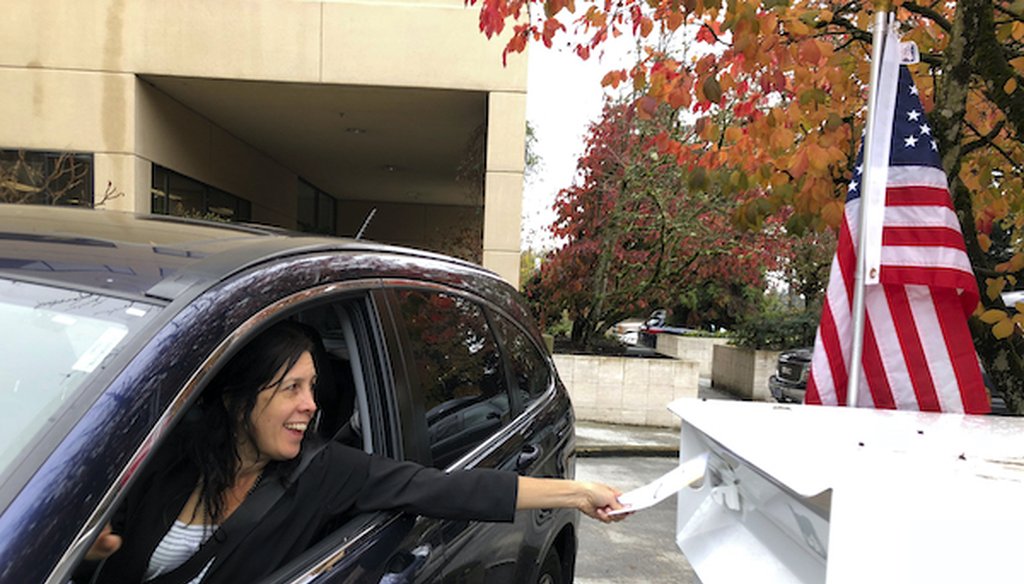Stand up for the facts!
Our only agenda is to publish the truth so you can be an informed participant in democracy.
We need your help.
I would like to contribute

In Oregon, elections are conducted entirely by mail. Voters can mail their ballots or drop them at official boxes. (AP)
If Your Time is short
-
A primary was held May 19 in Oregon, which conducts elections entirely by mail.
-
In Oregon, unregistered voters are automatically registered to vote when they apply for, or renew, their drivers licenses.
-
Voters must take steps to register as a Democrat or a Republican, which is required to be able to vote in a primary.
-
In the May 19 election, some voters expecting to receive ballots that included partisan races, such as for president and Congress, received ballots that included only nonpartisan races.
As President Donald Trump threatened states that want to increase mail balloting, a claim is circulating that Oregon, where all voting is by mail, denied Republicans the right to vote in partisan races on May 19.
A headline on an article on The Gateway Pundit, a conservative website says:
"Huge Scandal: Oregon Changes Hundreds Of Republican Ballots To 'Non Partisan' Denying GOP Voters the Right To Participate In Primary."
There’s no evidence yet to back up the headline.
But one state senator says his office has received hundreds of calls from angry voters who say they received the wrong ballot. And on Facebook, the My Party Was Changed Oregon page, created May 8, has attracted more than 1,700 members.
The situation in Oregon highlights one challenge of mail balloting, even as the federal Centers for Disease Control and Prevention recommends it to Americans as a way to reduce the risk of spreading COVID-19.
Mail voting pioneer
Oregon became a vote-by-mail-only state after voters there approved a referendum in 1998. Colorado, Hawaii, Washington and Utah also hold all elections entirely by mail.
Trump, who has repeatedly claimed with scant evidence that mail balloting results in widespread voter fraud, said on the day after Oregon’s election that a "rogue" Michigan official had sent absentee ballots to 7.7 million people "illegally and without authorization." Our rating was Pants on Fire. Michigan’s secretary of state had announced that she would send all registered voters an application to vote by mail in that state’s August primary and November general elections, not ballots.
One notable race in Oregon’s May 19 primary was financial adviser Jo Rae Perkins winning a four-way race for the Republican Senate nomination to challenge Democratic incumbent Sen. Jeff Merkley in November. She appeared to endorse, then recanted, the QAnon conspiracy theory, The Oregonian reported.
Different voters, different ballots
In Oregon, primary elections are closed, which means only registered Democrats and registered Republicans can vote in their respective primaries.
So, Oregon voters registered as Republicans receive ballots with Republican primary races on them and voters registered as Democrats get ballots with Democratic races. Nonpartisan contests appear on both ballots.
In the May 19 primary, there were partisan races for president as well as Congress and other offices; and there were nonpartisan races for offices such as state judge and county sheriff.
Anger and confusion surfaced when some voters received ballots with only nonpartisan races.
Voters say they got wrong ballots
People who posted on the My Party Was Changed Oregon Facebook page said they had been registered with one of the major parties for years, but received nonpartisan ballots; most said they were Republicans.
Some users claimed a conspiracy against Republican voters. Others pointed out that under the state’s Motor Voter Act, which took effect in 2016, Oregonians are automatically registered to vote when they apply for, or renew, their drivers licenses.
By default, those voters are registered as having no party affiliation. They have to take another step to register a party affiliation with the state. In the case of the May 19 primary, a voter had to register their party affiliation by April 28 to receive the partisan ballot.
That meant some voters who were registered as nonaffiliated didn’t get to change their affiliation in time.
There had been indications that many voters could find themselves in that situation.
Oregon Public Broadcasting reported in December that according to the Secretary of State’s office, the number of non affiliated voters had increased by nearly 60,000 since the beginning of 2019. The news story said that was largely due to the motor voter law and the fact that most voters don’t select their party affiliation even though they should receive a postcard from the state instructing them on how to do so on the state elections website or by mail.
Some voters might have forgotten
It’s not clear whether longtime voters who complained about receiving a nonpartisan ballot simply did not realize they were not registered as a Democrat or Republican, or if mistakes were made by state officials, perhaps at the DMV, that resulted in voters being defaulted to nonaffiliated status.
State Rep. Mike Nearman, a Republican, told PolitiFact his office has received hundreds of complaints from voters who say they received the wrong May 19 ballot. He said that after speaking to some GOP voters, it’s clear they had forgotten they had changed their status from GOP to unaffiliated after, for example, getting mad at a particular GOP politician. But he said the number of complaints has led him to seek answers from the DMV on whether there may have been software errors or other explanations. He said he hopes to have answers within a few weeks.
Andrea Chiapella, a spokeswoman for Oregon Secretary of State Bev Clarno, a Republican, said the office received a few requests to look into what might have happened, but that "we haven’t found any improper changes" to a voter's party affiliation without the voter's permission.
"We get a handful of these complaints every two years during a primary" involving both parties, she said, "and none have ever shown evidence that the political party was fraudulently changed."
Our Sources
Gateway Pundit, "Huge Scandal: Oregon Changes Hundreds Of Republican Ballots To ‘Non Partisan,’ Denying GOP Voters the Right To Participate In Primary," May 18, 2020
Oregon Secretary of State Bev Clarno, "Letter to the Voters," accessed May 20, 2020
Oregon Secretary of State, "Oregon Motor Voter Act FAQ," accessed May 21, 2020
Email, Andrea Chiapella, legislative and communications director, Oregon Secretary of State, May 20, 2020
SoundCloud, Lars Larson radio show interview of Mike Nearman, May 19, 2020
Interview, Oregon Rep. Mike Nearman, May 21, 2020
Lead Stories, "Fact Check: Oregon Did NOT Change Hundreds Of Republican Ballots To Non-Partisan Denying Republican Voters the Right To Participate In Primary," May 21, 2020
Facebook, My Party Was Changed Oregon page, accessed May 21, 2020
Portland Monthly, "With Oregon’s Closed Primaries, Nonaffiliated Voters Have a Much Shorter Ballot," April 21, 2020
Oregon Public Broadcasting, "Oregon Continues To See Increase Of Nonaffiliated Voters," Dec. 28, 2019
































